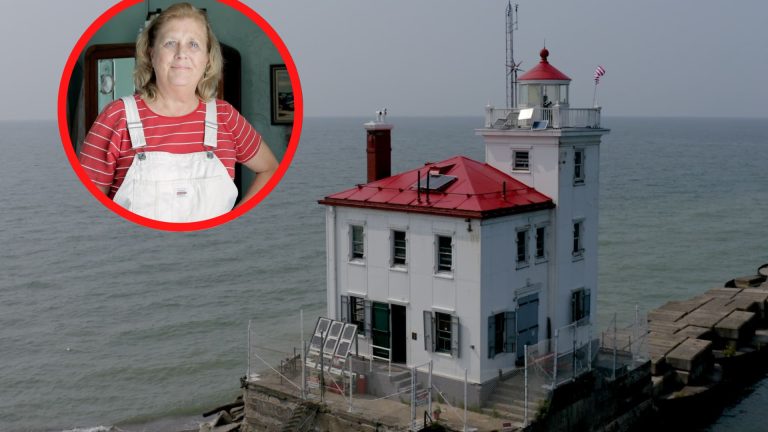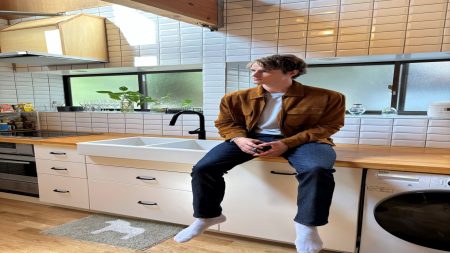In 2009, Sheila Consaul’s search for a second home took her on a much different journey than the more traditional one she’d expected. When the 65-year-old communications consultant heard news of the U.S. government auctioning off lighthouses, she was immediately interested.
Congress passed the National Historic Lighthouse Preservation Act in 2000. It allows the government to auction or give away “federally-owned historic light stations that have been declared excess to the needs of the responsible agency.”
“I thought a lighthouse would be a great opportunity to combine a summer home and my love of historic preservation,” Consaul tells CNBC Make It.
The Fairport Harbor West Lighthouse is located in Ohio and overlooks Lake Erie.
Peter Bittner for CNBC Make It
Consaul had previously restored a historic home and the idea of taking on a lighthouse sounded fascinating.
The Fairport Harbor West Lighthouse in Ohio became available at auction and Consaul started bidding in 2009. She landed the winning bid of $71,010 in 2011.
Built in 1925, the lighthouse has three bedrooms, three bathrooms, three floors, and is almost 3,000 square feet. It was abandoned in the late 1940s and Consaul is the first person to live in the lighthouse since then.
Consaul lives in the lighthouse from May to October and it sits empty when she’s at her primary home outside of Washington D.C.
Consaul lives in the lighthouse from May to October.
Peter Bittner for CNBC Make It
When Consaul took possession of the structure that had been abandoned for over 70 years, it needed a lot of work. All of the windows were broken, plaster was falling off the walls, and it “needed painting, desperately,” she says.
To purchase the lighthouse and to pay for the initial renovations, Consaul used a home equity loan of $200,000, according to documents reviewed by CNBC Make It.
Consaul started renovating in the summer of 2012, and over 10 years later, the project is almost done. “The renovation process has been long and arduous,” she says.
The property is a half mile from the nearest parking lot in Headlands Beach State Park, so big appliances like the stove and refrigerator needed to be transported by boat and then delivered by crane onto the platform of the lighthouse.
Since buying the lighthouse, Consaul estimates she has spent over $300,000 renovating it.
Consaul said the most important part of her renovation was adding a complete eat-in kitchen to the lighthouse.
Peter Bittner for CNBC Make It
Most of that money went towards adding an eat-in kitchen, state-of-the-art water treatment equipment, rewiring all of the electrical, plumbing, redoing the windows, and refurbishing the wooden floors.
Other than the extensive work the lighthouse needed, Consaul says her biggest challenge so far is that the lighthouse is completely off the grid. She depends on her gasoline-powered generator, solar power, and wind power.
Despite going over her initial $200,000 renovation budget, for Consaul the time and effort has been worth it. “This was a great challenge, a great opportunity, and I loved every minute of it,” she says.
Consaul renovated the entire lighthouse, but kept the original cast iron spiral staircase.
Peter Bittner for CNBC Make It
Though Consaul owns the lighthouse itself, the land it sits on belongs to the U.S. Army Corps of Engineers, which means she had to pay $2,500 for a 25-year lease.
Fairport Harbor West Lighthouse is still a working lighthouse and is used as an aide to navigation, so Consaul has the responsibility of working with the U.S. Coast Guard, the National Weather Service, and the Ohio State Historic Preservation Office when necessary.
The lighthouse’s beacon is still maintained by the U.S. Coast Guard. The light turns on every night at dusk and goes off at dawn.
The Fairport Harbor West Lighthouse is located a half mile from the nearest parking lot in Headlands Beach State Park.
Peter Bittner for CNBC Make It
When Consaul bought the lighthouse, she knew that it was also a beacon for her new community. It’s why she has hosted open houses to celebrate the lighthouse’s birthday, June 9, nearly every year since 2012.
“One thing that was very important to me when I bought this lighthouse was that I understood that this was part of this community of Fairport Harbor,” she says.
As long as she owns the lighthouse, Consaul will continue offering private tours and said that if she lives out the 25-year lease, she plans to renew.
DON’T MISS: Want to be smarter and more successful with your money, work & life? Sign up for our new newsletter!
Get CNBC’s free Warren Buffett Guide to Investing, which distills the billionaire’s No. 1 best piece of advice for regular investors, do’s and don’ts, and three key investing principles into a clear and simple guidebook.
Read the full article here









